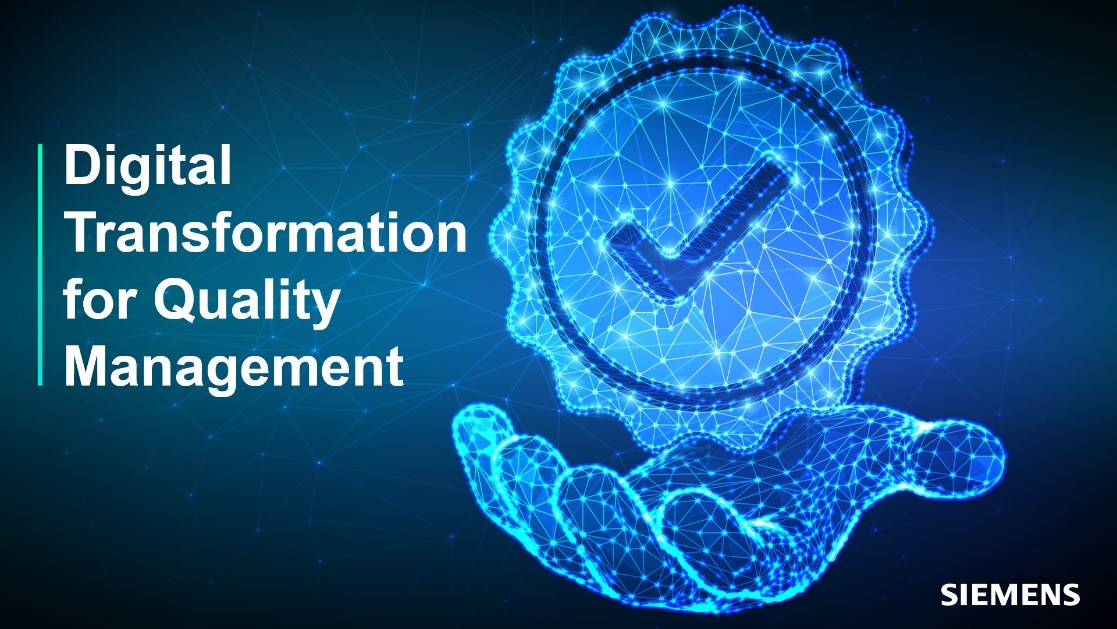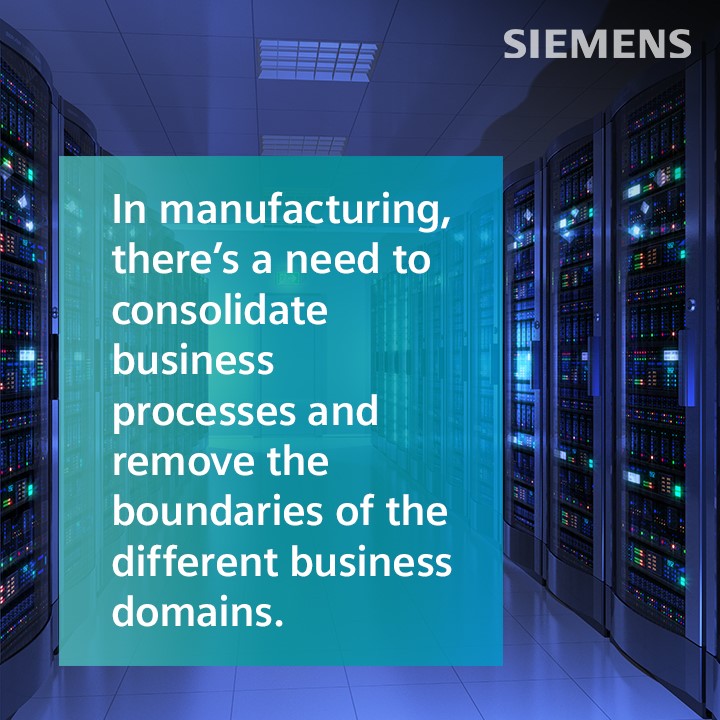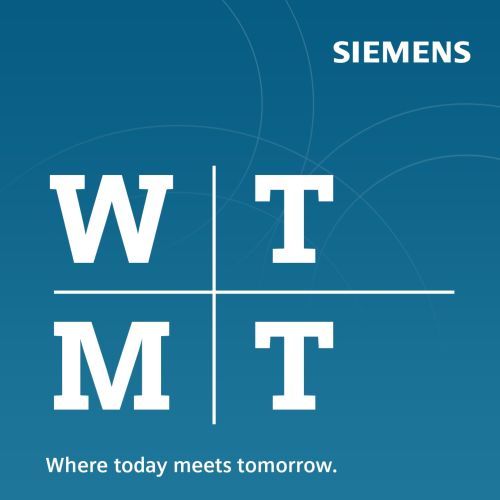Ensuring quality excellence across the value chain

Digital Transformation Drives Quality Innovation
As the world begins to face more unpredictable challenges – pandemics, weather events, changing economic conditions – manufacturing agility and resilience will be the key to success and survival.
Quality excellence in a product is not only what the manufacturer puts in, but what the customer gets out and is willing to pay for. It has the potential to make or disrupt a business in today’s highly competitive environment which is why a company should consider any opportunities to improve the quality of its product without increasing production costs.
The Digital transformation for quality management is a 5-part mini-series podcast, part of Where Today Meets Tomorrow, focusing on the value of quality management in the digital era and what to be expected from it in the future.
In this first episode, Bettina Pruemper is joined by Bela Kast, Senior Director for Software Engineering at Siemens Digital Industries Software. He’ll be sharing his insights about the value of quality in digital transformation, and how to leverage it to ensure product quality excellence across the value chain.

Effective Quality Management
In this episode, you will learn:
- The trends shaping the manufacturing industry today (02:53)
- The meaning of quality in a digitalized environment (07:26)
- How Siemens helps customers increase product quality as they adopt digitalization (08:39)
- What Siemens Xcelerator is and how it works (10:34)
Stay tuned for the next episode on January 17th!
Connect with Bela Kast:
Connect with Bettina Pruemper:
If you are interested in Quality Management topics, you might also check:
- A virtual tour: Closed-loop quality from design to manufacturing
- “A broad approach to Quality Management. Closed-loop quality solution leverages Teamcenter backbone” – A CIMdata commentary.
[00:11] Bettina Pruemper: Welcome to Where Today Meets Tomorrow. I’m Bettina Pruemper, and I’m your host with Siemens Global Marketing. I will present a special podcast miniseries as part of Where Today Meets Tomorrow, where we talk about how to realize innovation and digital transformation in the context of the quality management. You’re going to listen to five episodes dedicated to “Digital Transformation for Quality Management”. During this first episode, you can learn how to ensure quality excellence across the value chain. Today, we will be introducing you to the meaning of quality in the age of digital transformation and unprecedented innovation. With increased complexity everywhere, what are the trends? And what can companies do right now to gain a competitive advantage? As you might imagine, quality is one of the key drivers to success for a manufacturing company. So, today, we are talking about digital transformation for quality with an expert on the topic of quality management.
[01:11] Bettina Pruemper: I’m pleased to introduce today’s special guest, Bela Kast. He is Senior Director for Software Engineering at Siemens Digital Industries Software. Welcome, Bela. Thanks for taking the time to talk to us about the future of quality management. How are you?
[01:26] Bela Kast: Hi, Bettina. Doing well. Thanks for having me on your podcast. I’m excited to be here today.
[01:31] Bettina Pruemper: We are glad to have you here. So, before we dive in, could you please share a little bit about your background and role at Siemens?
[01:38] Bela Kast: Yeah, sure. I came to Siemens through an acquisition in 2012. So, I’ve been with Siemens roughly about for the past 10 years. My work life in Quality began in 2001 when I joined the company that was acquired. I started out being a consultant in the automotive industry and implementing, planning and shop floor quality systems that is nowadays called QMS Automotive. And this job brought me around the world from Argentina to China, from South Africa to Great Britain, mostly for German car manufacturers and global first-tier suppliers. Taking it on to management positions, basically started out with Service Account Management, Managing Director of a business consulting group, MOM, Manufacturing Operations Service Director for our region here in Germany. And now, today, I’m responsible for the delivery of our quality products in the software business unit of the Siemens Digital Industry division. And I’m glad to be here today.
[02:43] Bettina Pruemper: So, Bela, it’s time to leverage your knowledge to get some deeper insights. But before we start, I think it makes sense to first discuss the main trends shaping the industry today. In the digital age, changing consumer behavior is shaping the future of product innovations across all industries. So, quality excellence in product and production is as critical as speed to innovation. With increasing product personalization and supply chain complexities, how will manufacturers boost innovation cycles and minimize quality cost risks? Bela, could you provide us some guidance by explaining the main trends for manufacturers?
[03:21] Bela Kast: Sure, Bettina. But on top of what you said, I think the past 18 months, the pandemic situation that we are all in has taught us a very significant lesson. We need innovation in the manufacturing sector, that I think that was pretty obvious in this time-space. There is a great urgency for manufacturing agility and resilience as well. Before we go into the details, let’s capture actually a couple of trends shaping our industry that we are working for today. The first trend – and I don’t think it’s a new trend – is globalization and challenging markets. Let me explain why I believe so. In a sense of a global and harmonized quality management system, we need to optimize the operational quality footprint and leverage central design and engineering milestones. In manufacturing, there’s a need to consolidate business processes and remove boundaries of the different business domains. The second trend is the increasing complexity of products and processes and the integration into organizations and the supply chain. And I basically mean that the amount of product variance is increasing and that establishes a great pressure for a faster product introduction cycle for best-in-class products. So, there’s a need to manage all aspects of quality in a software solution throughout the entire product lifecycle from early requirements until the end of business of a product. Number three trend, Bettina, is to achieve and exceed customer expectations. Achieving this means to avoid any damage of reputation for any given brand and product in the market. Just think of what product recalls due to poor quality, due to your recognition and revenue in a specific market space. Managing quality holistically in a common and integrated system enables our customers to a higher efficiency and transparency in product and process development, as well as in manufacturing. And not to forget, the latest trend is basically applying Data Analytics and Artificial Intelligence to redesign quality. And I really mean redesign quality, basically means from prevention to prediction. I think the new capabilities of Artificial Intelligence are impacting the perception of quality, and it’s opening new opportunities in our domain.
[05:58] Bettina Pruemper: So, you’re saying that digitalization changes not only all areas of life, but also the business models. And I also keep hearing about the increasing complexity everywhere. So, on the one hand, challenging markets, the critical need of integration for products and organizations, and also new disruptive technologies as to redesign quality. And on the other hand, customers demand to achieve and exceed their expectations. So, it’s a complex scenario in which manufacturers are dealing in.
[06:29] Bela Kast: Absolutely, Bettina.
[06:31] Bettina Pruemper: So, let’s extend on that. What are the right strategies to address these challenges to achieve quality excellence?
[06:39] Bela Kast: So, in today’s market, companies are always challenged in digitalization and innovation – that is not a piece of cake. While they have to continuously improve their quality to make a difference with their products and gain a competitive advantage. This is what it’s all about. So, foremost, the strategy is to digitalize your data to have: a faster go-to-market with; improved quality; the ability to be flexible to change with; a high level of supply chain collaboration and integration paired with; sustainability; and, of course, the urge to zero-emission.
[07:18] Bettina Pruemper: So, in a way, these strategies are forcing manufacturers to innovate and change their mindset and their digital culture. So, what does quality mean in a digitalized environment?
[07:30] Bela Kast: Quality excellence in today’s context is, so to say, a traditional concept of manufacturing. It is conformance to requirements that reaches out to operational excellence, and this complying with standard guidelines and regulations. And it mainly has to focus to ensure a premium user experience and build and maintain a strong brand reputation to ensure top-level performance, reliability, and durability. And I believe that we remain for many more years to come. On the other hand, we are continuously talking to analysts, and they are pointing out that closed-loop quality capabilities are crucial to success for a company in a digitalized world. And quality needs to adapt and find the vital answers to be geared towards an Industry 4.0 context. So, what we in Siemens are working on is to tackle the challenges of tomorrow by bringing Artificial Intelligence, like predictive quality, to support and automate quality processes and software as much as possible.
[08:38] Bettina Pruemper: So, the goal is producing products faster with improved quality and to gain a competitive advantage. Your intent is not to disrupt or upset the habits of the experts working in each domain, but to support a paradigm shift with leveraging on a digital approach to reduce the risk of poor-quality performance. How do you support your customers in bringing their strategy to work?
[09:07] Bela Kast: Exactly. What we have done is by bringing quality excellence to our content and collaboration backbone, Teamcenter, we are making quality and integrated part of design, engineering, and manufacturing of a company, enabling a digital twin including quality. And that helps our customers to break the silos between the different departments and allow the traceability of all activities, providing a common repository for all domains, and deliver a common change management process. And that is key to the future, Bettina.
[09:44] Bettina Pruemper: So, we can say that if quality management is a common need for manufacturers, but the path they follow could be different, and it’s time to reshape the conventional approaches into a digital approach. So, Siemens supports digital transformation across the entire product lifecycle. And we understood that digital approach can greatly reduce the risk of poor-quality performance. Does it only work for a large enterprise company?
[10:14] Bela Kast: No, it doesn’t. We made sure that we are also able to bring our portfolio to the SMB market. We are leveraging our cloud activities to bring our comprehensive approach to this competitive market.
[10:27] Bettina Pruemper: Thanks for all these insights, Bela. So, what do I need to look for if I want more information on this?
[10:35] Bela Kast: What we do is we comprise our comprehensive digital twin efforts in a program called Xcelerator.
[10:41] Bettina Pruemper: Hold on a second. Xcelerator? Could you explain to our listeners what it is?
[10:45] Bela Kast: Sure, Xcelerator is a portfolio of not only software, it consists of services and an app development platform that speeds up your digital transformation, including your journey in the quality domain. And then how does it work? It delivers a comprehensive digital twin with personalized and adaptable solutions with rapid application development that is flexible and open to incorporate the latest technologies.
[11:16] Bettina Pruemper: Wow! It’s certainly amazing what impact the Xcelerator portfolio can have for a company, which brings us to the end of this first episode of “Digital Transformation for Quality” as part of “Where Today Meets Tomorrow”. Thank you, Bela, for joining us during that interesting discussion about quality excellence.
[11:36] Bela Kast: Bettina, thanks for having me today.
[11:38] Bettina Pruemper: As always, thanks for listening to the Siemens podcast. If you enjoyed our episode, please be sure to come back for more insights about quality in the context of the digital era. Also, for further information, you can visit us online at siemens.com/teamcenterquality and use the Contact section to reach out to us. Or you can just send us an email to mom-marketing.plm@siemens.com.
[12:01] Bettina Pruemper: Until then, this is the “Digital Transformation for Quality Management”, part of Where Today Meets Tomorrow. And don’t forget, leverage on quality management to connect the disconnected across the value chain to gain a competitive advantage. Thanks again and I’ll see you next time.

Where Today Meets Tomorrow Podcast
Amid unprecedented change and the rapid pace of innovation, digitalization is no longer tomorrow’s idea. We take what the future promises tomorrow and make it real for our customers today. Welcome to “Where today meets tomorrow.”
